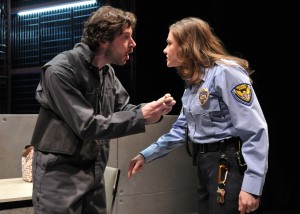
Greg (Andy Macdonald) confronts Carly (Danielle Muehlen) who is responsible for his break-up in a scene from the SpeakEasy Stage Company production of Neil LaBute’s Broadway hit reasons to be pretty, Photo: Craig Bailey/Perspective Photo.
reasons to be pretty by Neil LaBute, Speakeasy Stage Company, 3/4/11-4/2/11. http://www.speakeasystage.com/doc.php?section=showpage&page=reasons Contains mature language.
Reviewed Becca Kidwell
“Sticks and stones may break my bones, but words will never hurt me.” When we get out of high school, we hope the teasing will stop; however, we find new forms of teasing in fashion magazines, tv shows, and hanging out with friends. Have we become too sensitive? No. But where do we draw the line? How do we stop feeling put down by the world and begin feeling secure in ourselves? Speakeasy Stage Company’s production of reasons to be pretty by Neil LaBute makes us examine these questions through their dynamic production.
Anyone who knows about LaBute should not be too surprised by the tirade of expletives that open the play. They will not be too surprised that the cause is Steph, played by Angie Jepson, who hears that her boyfriend Greg, played by Andy McDonald, has described her face as “regular”. While it is an extreme reaction, we understand that it is akin to any answer to the question “do my jeans make my butt look fat?” Andy McDonald plays a calm, normal guy who dodges the verbal missiles on all sides, but still ends up with Steph leaving him. Angie Jepson’s belligerent performance is matched by the vulnerability she displays when Steph keeps returning to Greg for approval.
The incident is caused by the wife of Greg’s best friend Kent, Carly (played my Danielle Muehlen). Carly called Steph and told her about the “regular” comment; while Greg is angry, it may have been a blessing in disguise. Muehlen is beautiful and strong, but still demonstrates how all women are insecure about their looks; she conveys that Carly is an attentive listener and is really looking for someone to listen to her. Burt Grinstead plays Carly’s stereotypical male chauvinist husband, Kent. We learn during the course of the play that Greg and Kent have been friends since they went to school and that commonality is where their common ground really ends. Greg goes along with his friend’s discussions of the hot, new employee at the warehouse, but is disturbed–to some extent–with Kent’s treatment of his wife. Burt Grinstead performance takes Kent from being simply a “guy’s guy” at the beginning to being a misogynistic pig by the end; yet, one can see what Carly saw in him as well–strong, protective, handsome, and confident.
Eric Levenson’s set design looks like a prison with high gates and concrete walls. In actuality, it forms the main part of the warehouse where Carly, Kent, and Greg work. It also is used as the backdrop for the other locations in the play. It seems to symbolize that the characters are prisoners of their own fears and insecurities. Greg’s transformation in attitude from the beginning of the play to the end seems to support this hypothesis. Paul Melone’s direction flows seamlessly and uses this set to his advantage.
The production makes the audience laugh, get angry, and be pensive. It also shows hope that we can escape our “prisons”; if we become comfortable with ourselves and don’t look to others for approval, we may start to enjoy life. The strong ensemble gives the audience a slightly absurd, yet frighteningly real scenario. Speakeasy’s wonderful, thought-provoking production is well worth the stream of curses at the beginning (as long as you can withstand the urge to slap Kent). TNETG. 3/6/11.
